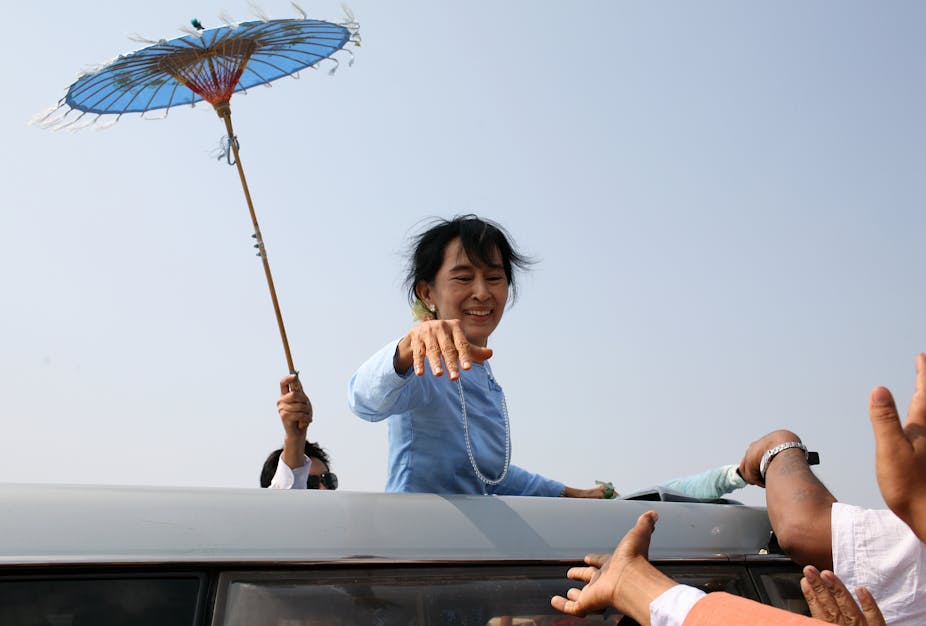Only two years after general elections in 2010, the world will be watching Burma’s by-elections to be held tomorrow.
Although the results cannot change the overall political balance of power with only 45 seats contested, the attention is there for two reasons. First, to see if the election points to real democratic reform and second, to watch the Nobel Peace Prize-winning opposition leader, Aung San Suu Kyi stand for election for the very first time.
National League for Democracy
Aung San Suu Kyi’s popularity in Burma (also known as Myanmar) cannot be doubted. She is one of several candidates for the National League for Democracy (NLD). She has campaigned across the country, in a Western fashion, to the point of exhaustion in order to lock in voter support.
The by-elections are also a test for the NLD, contesting elections for the first time since it won a majority of seats in Burma’s 1990 elections, having refused to participate in a 2008 referendum on a new constitution and in the subsequent general elections.
Inside Burma, nobody is taking the by-election results as a forgone conclusion, least of all the pro-government parties and parties formed by ethnic minority groups, among whom the NLD does not necessarily have the same strong following.
Real reform?
Just as importantly, the by-elections are widely seen as a critical indicator of the genuineness of the extraordinary process of political reform that has been gathering momentum in Burma for the past 12 months. The new, quasi-civilian Burma Government under reforming President Thein Sein has publicly committed itself to an election process that is better than that of 2010, when ballot boxes were famously stuffed with “early ballots” which (unsurprisingly) favoured government-party candidates.
To ensure this, they have for the first time ever invited international election observers from Burma’s ASEAN-plus network, including Australia.
Clearly, the process of these elections is as important as the political outcomes. The election process will probably receive a mixed report, rather than an unqualified “free and fair” rating, as many relatively minor problems have already been reported (but not verified).
Unpredictable politics
In themselves, the election results cannot change anything, although the political dynamics in Burma’s National Assembly will certainly change once Aung San Suu Kyi and her NLD colleagues take their seats (assuming they will win several, even if not all of them).
Thereafter, Burmese politics could be somewhat more unpredictable, and we could see more confrontation - and perhaps even tension - as previous political inhibitions break down. Suggestions to amend the constitution are already being canvassed, and after the by-elections, attitudes on such matters could be more polarised.
Probably inevitably, the by-elections are being cast as the signal for whether or not Western policies toward Burma should change, and in particular whether sanctions should be lifted.
This is unfortunate in several ways, not least of which is that reforms and progress under the new Burma government can (and should) be assessed and measured in many ways and in many fields; “free and fair” elections are only one criterion.
It might not be sensible for the international community to respond only on the basis of what Aung San Suu Kyi has to say publicly about the elections.
Suu Kyi’s new role
As a member of the National Assembly for the first time (but not in the government), Aung San Suu Kyi will be considering what kind of role she might play. She could continue to contribute actively but carefully to the new climate of public policy debate, criticising government policy from time to time, but essentially from within the parliamentary system and without implying she is calling for the government’s overthrow.

Even without a “government of national unity”, the present informal understanding between President Thein Sein and Aung San Suu Kyi is likely to continue. It is conceivable they will cooperate from time to time.
The reaction of the Burmese army to Aung San Suu Kyi’s presence in the parliament will also bear watching. At this point it seems unlikely that they would be tempted to stage a counter-coup. Although no longer directly responsible for governing the country, the army still exercises certain “reserve powers” under the constitution, which it has not yet had to resort to.
Nor is it absolutely certain that President Thein Sein will continue indefinitely to enjoy sufficient support among his former military colleagues. But equally, there are no signs so far of active opposition to him, especially when the new policies are demonstrably so popular among Burmese people.
Burma’s first steps
Whatever happens among all these “firsts”, Burma’s will have a new paradigm for its elections. They are a firm foundation for a transition to “democracy”, without foreshadowing what precise shape this might take.
In the immediate future, some form of cooperation between Burma’s political leaders would help lend stability to the process of change and reform, as well as of nation building, that Burma badly needs. The world can also anticipate that Burma will gradually become a more pluralist, more “normal” country, rather that being perpetually on the “outside”.
But it would be unwise of the international community to expect opposition views to prevail when they do not have the parliamentary numbers, at least not until the next general elections scheduled for 2015.

